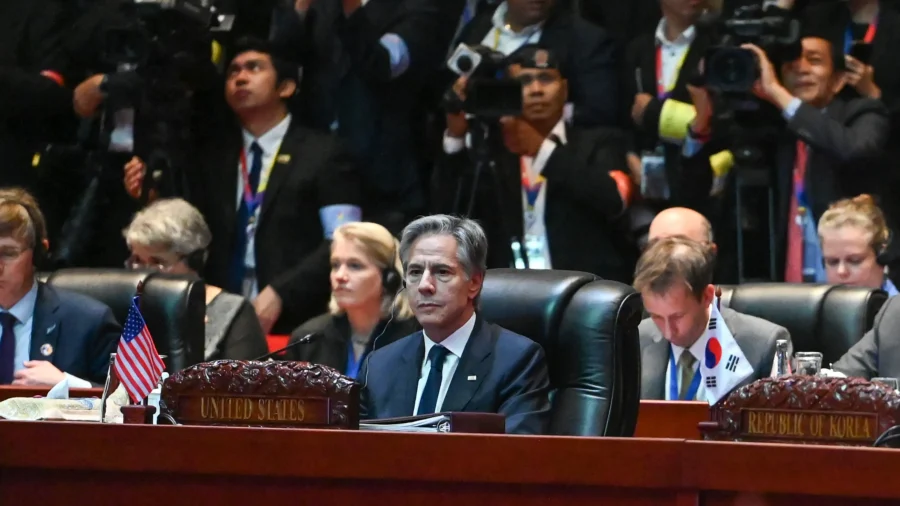The United States is concerned about China’s “increasingly dangerous and unlawful actions” in the South and East China Seas, Secretary of State Antony Blinken told leaders from the region on Thursday.
Speaking in Laos to leaders of the Association of Southeast Asian Nations (ASEAN), Blinken also warned Beijing not to use Taiwanese President Lai Ching-te’s national day speech on Thursday as a “pretext for provocative actions.”
In response, the Chinese regime blamed the United States and other military presences outside the region for instability in the waterway, which Beijing claims almost entirely.
The communist-controlled People’s Republic of China (PRC) claims sovereignty over almost all of the South China Sea. It rejected a 2016 international arbitration ruling by a U.N.-affiliated court in the Hague that invalidated its expansive claims and has built up and militarized the islands it controls.
About a third of global trade transits through the sea, which is also rich in fishing stocks, gas, and oil.
The PRC has territorial disputes with four out of 10 ASEAN members—Vietnam, the Philippines, Malaysia, and Brunei—and Taiwan, which Beijing claims to be part of the PRC.
In recent months, Chinese and Philippine coast guard ships have collided a number of times, and Manila has also condemned Beijing after flares were fired at Philippine aircraft.
The United States has warned repeatedly that it’s obligated to defend the Philippines—its oldest treaty ally in Asia—if Filipino forces, ships, or aircraft come under armed attack, including in the South China Sea.
As part of an annual military exercise, the U.S. army deployed its mid-range Typhon missile system to the northern Philippines in April, leading to repeated protests from the Chinese regime.
Philippine President Ferdinand Marcos Jr. complained to summit leaders on Thursday that his country “continues to be subject to harassment and intimidation” by China’s actions, which he said violated international law. He has called for more urgency in ASEAN-China negotiations on a code of conduct to govern the South China Sea. Officials have agreed to work on completing the code by 2026, but talks have been hampered by sticky issues, including disagreements over whether the pact should be binding.
Speaking on behalf of President Joe Biden during the 12th ASEAN–U.S. Summit, Blinken said: “We remain concerned about China’s increasingly dangerous and unlawful actions in the South and East China Seas, which have injured people and harmed vessels from ASEAN nations, and contradict commitments to peaceful resolution of disputes.”
The secretary of state reaffirmed the U.S. commitment to “support freedom of navigation and freedom of overflight in the Indo-Pacific ” and to protect “stability across the Taiwan Strait.”
Taiwan, or the Republic of China (ROC), is the continuation of an exiled power that controlled mainland China before the communist takeover in 1949. The PRC said it would endeavor to absorb Taiwan by peaceful means, but doesn’t rule out annexing the self-ruled island by force.
Addressing the nation on Oct. 10, Taiwan’s national day, Lai, whom Beijing has branded a “separatist,” vowed to maintain the status quo, saying the PRC and the ROC “do not belong to one another” and that Beijing doesn’t have the right to represent Taipei.
Since Lai took office in May, the Chinese regime has stepped up its rhetoric against so-called Taiwan separatists and declared that “diehard” supporters of Taiwan independence can be punishable by death, and ramped up military and patrol activities in the Taiwan Strait.
Reacting to Blinken’s Thursday remarks, Chinese Foreign Ministry spokesperson Mao Ning blamed the United States and other countries for destabilizing the South China Sea by upgrading its military presence in the region.
She also said Beijing’s dispute with Taiwan is China’s “internal affairs.”
In a report published on Thursday, the Washington-based Center for Strategic and International Studies think tank said an estimated $2.45 trillion worth of goods, or over one-fifth of global maritime trade, transited the Taiwan Strait in 2022.
Elsewhere in the region, Chinese law enforcement officers had beaten Vietnamese fishermen and confiscated their equipment on Sept. 29, according to the Vietnamese government.
On Aug. 26, a Chinese military plane breached Japanese airspace.
The Associated Press contributed to this report.
From The Epoch Times

